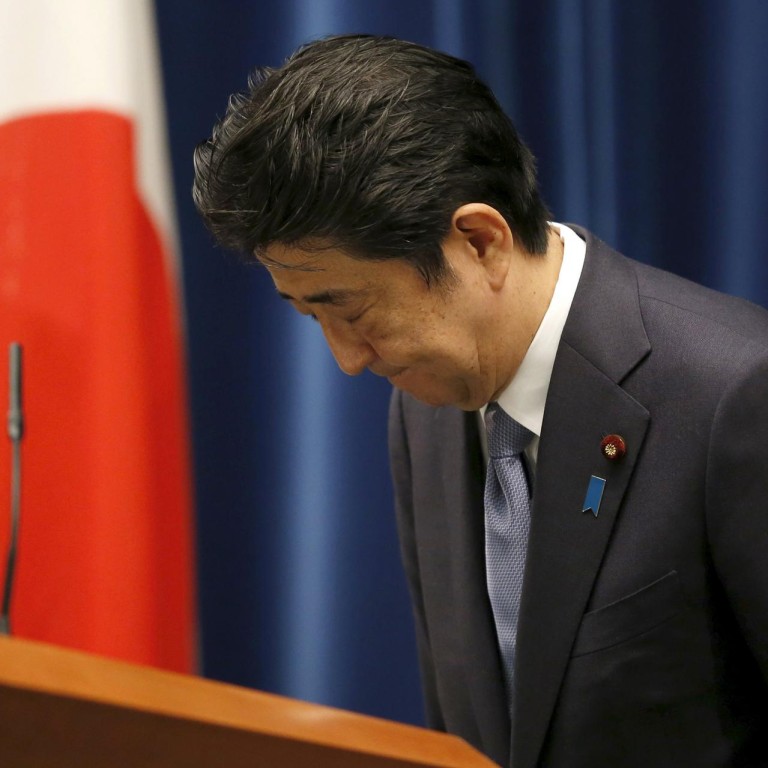
Japanese Prime Minister Shinzo Abe's war apology rings hollow
Kevin Rafferty says the rambling, awkward 70th anniversary speech, followed by commemorations at the Yasukuni Shrine, did nothing to mend tense relations with China and others
Critics of Prime Minister Shinzo Abe have to concede that he used the right buzzwords in his address marking the 70th anniversary of the end of the war. He talked of Japan's (aggression), (colonial domination), (deep remorse), and finally used the magic word (apology).
Did he really mean the words? The next day there were commemorations at the Yasukuni Shrine, where the souls of convicted and hanged war criminals are enshrined with 2.47 million others who died in wars for Japan from the Meiji era.
A parade of people in Imperial Army uniforms marched to the outer shrine, proclaiming Japan's war glories and asserting that the country had done no wrong. Three members of Abe's cabinet and 67 members of parliament went inside to pray.
It is for the victim to decide whether the apology is acceptable or sincere, not for the victimiser to decide when enough is enough
Abe himself did not visit, but sent a ritual cash offering, which surely renders him open to a charge of hypocrisy.
There was an instructive contrast between Abe's address and Emperor Akihito's brief speech at the national memorial on Saturday, the actual day of the surrender 70 years before. The emperor bowed his head and spoke of his "deep remorse", expressing hope that "the ravages of war will never be repeated".
By contrast, Abe's was a long, carefully crafted statement that rambled between past and future. At times, he offered an apologia for Japan's conduct. He claimed that Japan's victory in the 1905 war with Russia "gave encouragement to many people under colonial rule from Africa to Asia". Then he blamed Japan's isolation after the first world war and its broken political system for leading it to challenge the international order.
Watching him, his body language was awkward and contorted. When it came to the atrocities of war, Abe listed first the sufferings of the Japanese people. He seemed to be saying that, in war, stuff happens. Abe was not brave enough to name the comfort women, the Nanking massacre victims or other atrocities. In war, stuff does happen, but often because of officers' bad decisions, hatred or evil. Even when Abe mentioned the buzzwords, including apology, he was relaying previous governments' apologies. He did not make his own.
Abe clearly wanted to draw a line under his non-apology so that Japan would not apologise any more. He declared: "We must not let our children, grandchildren, and even further generations to come, who have nothing to do with that war, be predestined to apologise."
Japanese nationalists ask: "How many times must we apologise?" But it is for the victim to decide whether the apology is acceptable or sincere, not for the victimiser to decide when enough is enough.
Equally, the persistent offering of homage at Yasukuni undermines the sincerity, and the failure of nationalists to understand how the rest of the world sees their actions should make Japan pause to think.
What does it matter? For the past 70 years, as Abe stated, Japan has pursued a policy of peace and development, helped "through the goodwill and assistance extended to us that transcended hatred by a truly large number of countries, such as the United States, Australia and European nations, which Japan had fiercely fought against as enemies".
It is interesting that he did not bring China into this friendly embrace or note how the two countries helped each other's development once Deng Xiaoping opened China's door to the world. Abe should open his blind eye to such an important neighbour.
There is a war of words over territories in the China seas, Beijing is busily building on disputed islands, and China and Japan are boosting military spending. Abe is undermining the rest of the world's definition of democracy by passing secrecy laws, expanding the role of Japan's military in defiance of popular wishes and trying to rein in the media.
As the famous saying goes, "Those who don't know history are doomed to repeat it." Abe should remember that. The rest of the world should note his failure to understand. All in all, it was a sorry apology.

